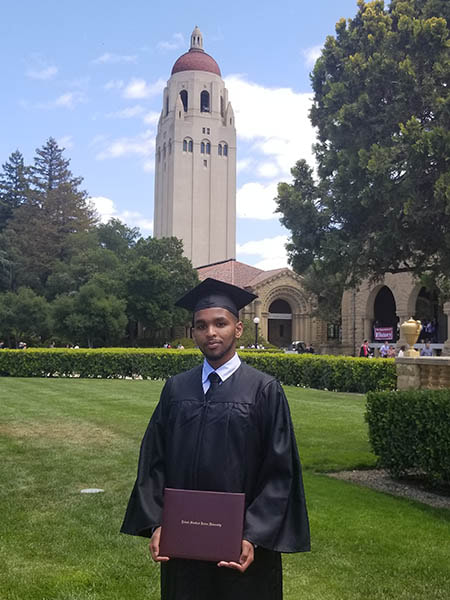Despite countless challenges, many families served by housing authority programs have permanently exited poverty.
|
The Yakima Housing Authority
YHA's Cosecha program helps farm workers raise their families and empowers them economically to make a better future for them and their children. |
Seattle Housing Authority
Hear about how SHA's residents have found new opportunities through stable housing. |
Mohamed
Falling In Love With Books
|
Mohamed, whose family immigrated to the United States after fleeing war in East Africa, knows what it’s like to struggle in school. ”I didn’t speak English,” he said. “We spoke Somali at home, so things like reading were at first very difficult for me.”
In third grade, a volunteer tutor changed Mohamed’s life. “She read with me after school a few times a week, and that helped me build my skill level up and confidence.” By the fifth grade Mohamed was reading above grade level and had fallen in love with books. He’s been an avid reader ever since. In high school, Mohamed became a tutor himself, working with an organization called Team Read at an elementary school. After graduation he decided to dedicate a year of service with City Year, an organization which seeks to eliminate educational disparities in the United States. “I had grown very passionate about education and educational equity,” he said. Mohamed volunteered 1,700 hours tutoring and mentoring youth that year. “When you see the light in a kid’s eye after they master that one math problem or read that chapter they thought they couldn’t read, it’s all worth it,” he said. His next stop was College, where an English teacher suggested he write for the student newspaper. A year later Mohamed was editor-in-chief. During college he also found time to serve on the City’s Immigrant and Refugee Commission where he worked directly with the mayor, City Council and different City agencies. In his community, Mohamed was the youth mentor for the Pavement to Parks project. “The special thing about [my] community is that people from all parts of the world live here, and live here in harmony,” he said. “We need to support these communities and in so doing, make everybody strong.” As he was completing community college, Mohamed applied to Stanford University. “Honestly I was expecting to be rejected. So I click on the email and the first word I read is ‘Congratulations,’ and I was just blown away. I don’t think I even read the other words. I just went downstairs screaming and hollering and told everybody in my family - I got into Stanford!” Mohamed was one of 20 transfer students accepted out of an applicant pool of more than 2,000. Mohamed plans to attend law school, and hopes to work in public interest law, advocating for immigrants and refugees. |
Jeff
Supporting Our Veterans

Prior to becoming homeless, Jeff was injured on the job and unable to work. He “made some bad choices” which led to homelessness. He had been living out of his car and relying on family for a few years when he received his Veterans Affairs Supportive Housing (VASH) voucher. Travelling from family member to family member was very stressful, he said since he felt that he was disturbing their routines with his presence.
As a “fairly organized type of guy,” having his belongings in the trunk of his car was frustrating, like living out of a large suitcase. While homeless, he was diagnosed with anxiety and mild depression, which he believes will go away now that his voucher provides him and his son with a stable place to live.
Thanks to his VASH voucher, he and his son now live in their own place, each with their own bedroom. Jeff is also attending college. He believes that thanks to his housing, both he and his son will gain independence and confidence. Having a stable place for his family to live has given him a “better outlook on life” and “made life more complete.”
He says that he can’t give enough thanks to everyone whose hands touched the paperwork that led to his voucher. Jeff is the recipient of one of the 245 VASH vouchers HUD allocated in round 1&2 of 2018. His lived experience is an example of why more resources should be invested in this program. In 2018, there were 1,636 other Vets like Jeff, waiting for support. HUD should increase VASH voucher allocations to serve those who have served U.S.
As a “fairly organized type of guy,” having his belongings in the trunk of his car was frustrating, like living out of a large suitcase. While homeless, he was diagnosed with anxiety and mild depression, which he believes will go away now that his voucher provides him and his son with a stable place to live.
Thanks to his VASH voucher, he and his son now live in their own place, each with their own bedroom. Jeff is also attending college. He believes that thanks to his housing, both he and his son will gain independence and confidence. Having a stable place for his family to live has given him a “better outlook on life” and “made life more complete.”
He says that he can’t give enough thanks to everyone whose hands touched the paperwork that led to his voucher. Jeff is the recipient of one of the 245 VASH vouchers HUD allocated in round 1&2 of 2018. His lived experience is an example of why more resources should be invested in this program. In 2018, there were 1,636 other Vets like Jeff, waiting for support. HUD should increase VASH voucher allocations to serve those who have served U.S.
Brittany
Face Life Until You Make It!
|
“I grew up in Kelso, Washington, on housing assistance, raised by a single mother. I didn’t finish school. I had my first son and worked all kinds of odd jobs to afford a roof over our head. Money was always tight due to the cost of housing, child care and basic needs. I couldn’t afford rent and became homeless.”
That all changed when Brittany received housing. “I lived in a Public Housing project then was able to transfer to the HCV Program. While there, I accessed resources at CAP’s Job Training Program and signed up for the Family Self Sufficiency program. I really enjoyed the support and goal making process.” “In the next five years, I’d like to advance in my current job, up to management. Knowing that my sons are healthy and will also be able to discover their own opportunities allows me to feel secure and that I can do life on my own. I’d also like to check into the possibility of homeownership.” |


